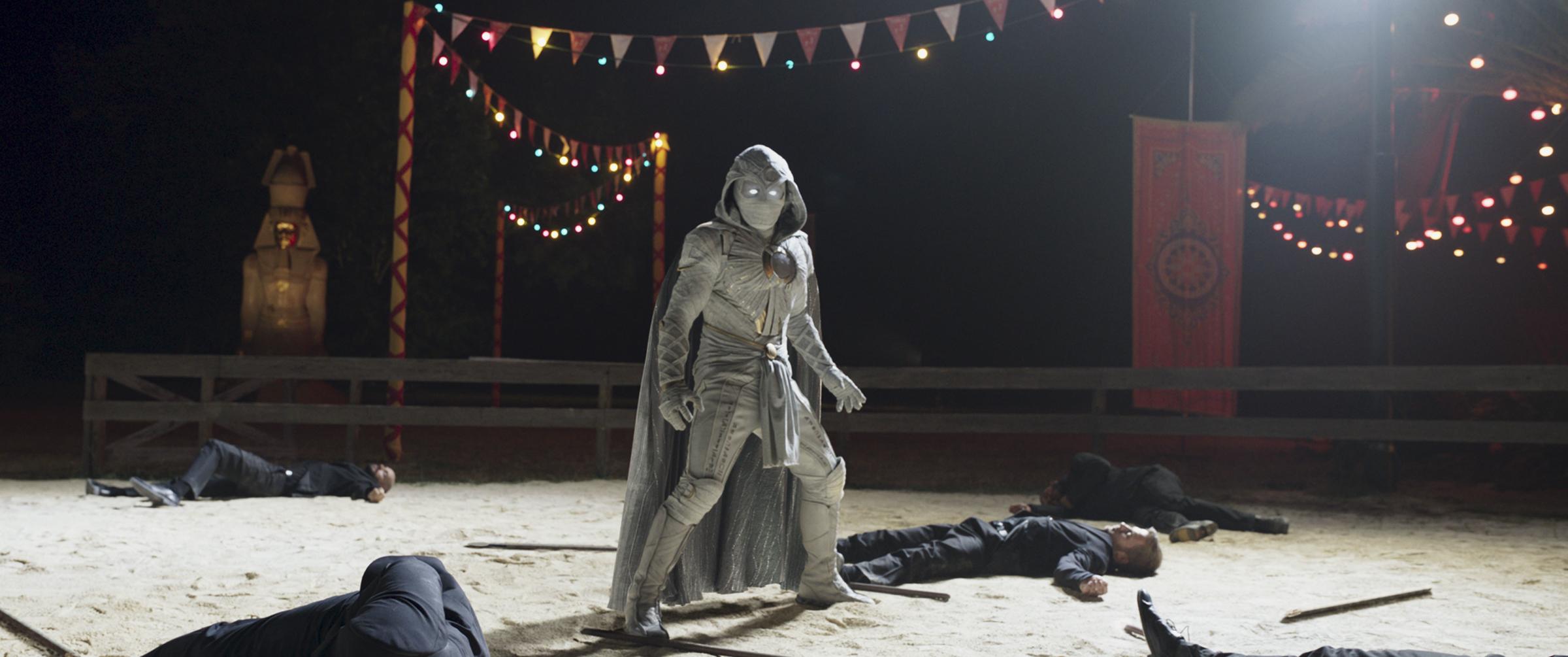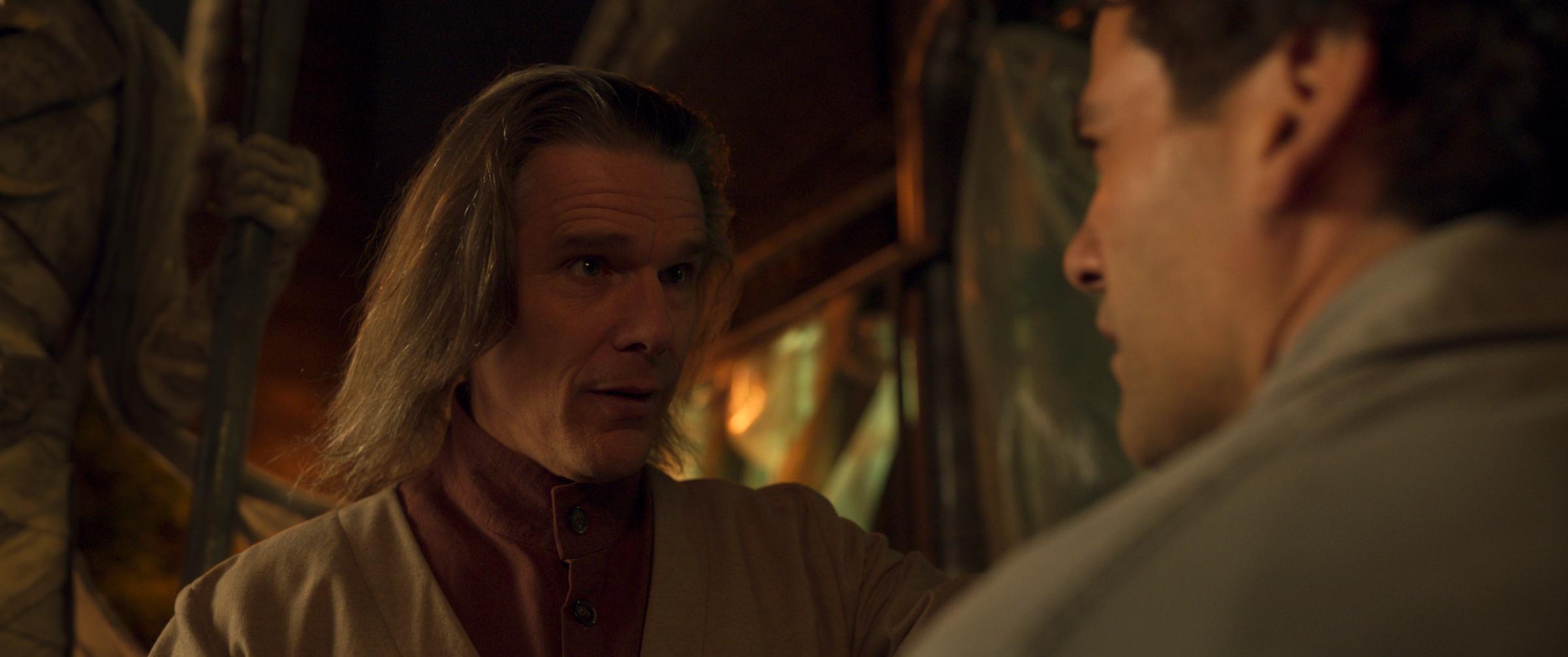Ethan Hawke’s participation in Moon Knight should have tipped us off. The actor has long expressed skepticism about the rise of superheroes in Hollywood. But somehow, Oscar Isaac convinced Hawke to come onboard for a TV show about an obscure Marvel superhero who is possessed by the Egyptian god of the moon. There had to be something different about this Disney+ show that distinguished it from the streaming service’s increasingly formulaic iterations of Marvel and Star Wars properties.
So, yes, Moon Knight is bonkers—in the best way. Marvel has tried to break from the typical superhero tropes before, most notably with last year’s WandaVision, in which the characters of Wanda and Vision (Elizabeth Olsen and Paul Bettany) find themselves stuck in TV sitcoms, playing out the white picket fence family life they never got to have. Riffing on the typical beats of American sitcoms, WandaVision was, at first, more interested in exploring the formal bounds of superhero stories than servicing the broader Marvel Cinematic Universe. But the final episodes devolved into the typical, dull CGI battles we’ve come to expect from superhero shows. And they introduced all sorts of characters and easter eggs—as if to reassure its audience that the Marvel shows wouldn’t get too experimental.
Though far from perfect, Moon Knight does offer hope that Marvel is willing to drop its more predictable story beats. In the four episodes offered to journalists before the release of the series, the characters make only one reference to the rest of the MCU in a blink-and-you’ll-miss-it allusion to the city of Magipoor, featured in Marvel’s clunky show, Falcon and the Winter Soldier.
Instead, Moon Knight is intent on focusing on character work. The show centers on Isaac’s Steven, who has dissociative identity disorder. When we meet him, he’s a socially awkward Brit who works in a gift shop and spends his spare time talking to his fish and nerding out over Egyptology. He chains his leg to his bed to prevent what he believes to be a particularly pernicious form of sleepwalking: He often awakes from bad dreams with blood on his hands.
Eventually Steven meets his more confident, deadlier, and—in one of the show’s funnier bits—somehow more handsome personality, Marc, an ex-mercenary with a wife he’s abandoned and a secret cell phone hidden in Steven’s apartment. Steven catches on to Marc’s presence whenever he emerges from a blackout and hears yet another voice groaning, “The idiot is back.” This third voice turns out to be the moon god Kohnshu, a disembodied voice who occasionally manifests as a skeleton bird with a scythe (F. Murray Abraham, having a ball giving violent commands in a sonorous voice). Steven and Marc fight with each other through mirrors, puddles, and other various reflective surfaces over who gets to control their shared body.

For much of the early run of Moon Knight, Steven, like the audience, is playing catchup as to when his multiple personalities emerged, whether Marc is dangerous, and why he can summon a snazzy white suit that absorbs bullets and gives him healing powers. The answers may lie with Layla (Ramy’s May Calamawy), the wife of Marc who explains to a confused Steven that they’ve spelunked many a pyramid together. (Steven develops a crush on her, to Marc’s chagrin.) Over and over again, Marc and Steven bicker over who should hold the body while Layla begs them to “summon the suit,” since Ethan Hawke’s bad guy is baring down on them. If Steven, the pacifist vegan, is in control of the body, he usually refuses.
As a result, Isaac doesn’t wear the Moon Knight suit much. Watching Isaac, run suit-less, wide-eyed and charmingly sweaty from a demon hyena or one of the other ghouls that Hawke’s cult leader character summons evokes another Disney+ series, The Mandalorian. I’m a fan of that Star Wars show mostly thanks to the titular Mandalorian’s adorable little companion. But the series’ very famous star, Pedro Pascal, has lifted his helmet to show his face exactly two times in The Mandalorian’s two seasons. Fans have begun to speculate that Pascal isn’t in the suit much while filming.
And even if Pascal is hiding under there, what’s the point of casting a movie star when you don’t get to see his face? This is an increasingly pressing problem as more and more TV shows and films center on masked men (and women). I’m sure Hollywood executives are holding long meetings about how often Spider-Man or Darth Vader should pull off their masks to remind the audience there’s an actor under there. A fabulous Isaac makes a compelling case for shunning the mask.
The actor clearly delights in playing Moon Knight’s different personalities and bickering with himself. The mild mannered Steven rolls his eyes in shock when conversing in the mirror with an agitated Marc, who boasts the swagger and ego of Indiana Jones. If the comics are any indication, we’ll get to meet even more personas and watch Isaac flex his acting muscles further. The struggle between the two men the central plot, with Steven/Marc’s possible connections to Doctor Strange or Spider-Man thankfully shunted to the side.

The story can be nonsensical, with the revelations about Steven/Marc’s past often hard to follow. The show attempts—not always with success—to carefully navigate Steven’s mental health issues. And while the inclusion of specific shots and musical moments from Indiana Jones are meant to pay homage to the storied franchise, they often diminish Moon Knight’s power. The audience is reminded not only that Steven Spielberg is an unmatched director whose adventure movies are shot far more beautifully than this one, but that perhaps a show about Americans and Brits plundering Egypt’s antiquities is not the best choice of story for 2022. (In fairness to the series and its many “authentic storytelling” consultants, Layla’s Egyptian identity and the battle over who really deserves to own the Egyptian treasures displayed in British museums, are central to the plot.)
By episode four, the show seems to be falling back on formula and can start to feel like a bad Mummy remake. But just when you’re getting a little bored, the show pivots (no spoilers). It offers hope that the show will not fall back on the typical arc of superhero stories, as WandaVision did, and try something a little bit weird.
For more of TIME’s culture coverage, subscribe to our entertainment newsletter, More to the Story, by clicking here.
More Must-Reads from TIME
- Donald Trump Is TIME's 2024 Person of the Year
- Why We Chose Trump as Person of the Year
- Is Intermittent Fasting Good or Bad for You?
- The 100 Must-Read Books of 2024
- The 20 Best Christmas TV Episodes
- Column: If Optimism Feels Ridiculous Now, Try Hope
- The Future of Climate Action Is Trade Policy
- Merle Bombardieri Is Helping People Make the Baby Decision
Write to Eliana Dockterman at eliana.dockterman@time.com